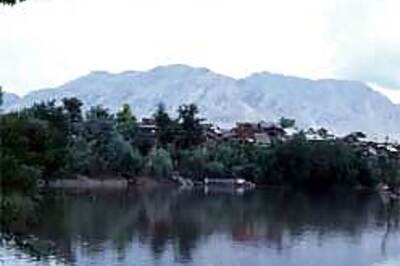
views
Taiwan Sees a Sea Change While Being a Democracy
Formosa, adequately mentioned in history with Portuguese explorations in 1542, is nestled at the junction of the East and South China Seas in the northwestern Pacific Ocean, Taiwan, with recent ancestry spanning 6000 years and with the ‘Taiwan Miracle’ that was initiated in the 1960s, has come a long way to evolve as a geopolitical entity that is recognised by the civilised world. A democracy, ranked high in civil liberties and human development, Taiwan is a stark positive compared to the dark shadows of China which is mired with autocracy.
In 2020, when President Tsai Ing-wen rode a wave to Office while showing signs of resistance towards the People’s Republic of China (PRC), the public sentiments over the last few years, especially owing to the anti-China stance to make a mark in international geopolitics and smooth handling of Covid-19 pandemic has gotten emboldened with most differentiating between their hard-earned democracy and the danger that looms while being subservient to PRC.
While the dangers from the PRC are real and imminent, geopolitics and proximity to the US has catered to a restraining effect and the fact that the PRC is not a ‘capable’ military hegemony yet limits its ambitions and actions against Taiwan through military means. However, the situation with foreseeable future of conflict looms large over Taiwan; especially given the politics within the US that China has been able to interfere with through deft diplomacy, media control and propaganda since the period leading to the ouster of then President Donald Trump.
Since the 1960s, Taiwan has seen a substantial developmental drive and has excelled in technology. Healthcare and more with blooming democracy with civil rights being guaranteed to its citizens and economic advantages being accrued due to geopolitics.
President Tsai Ing-wen cannot run again due to term limits but she has infused much national pride in citizens and diaspora of Taiwan and also positively influenced international favours and good relations towards Taiwan. Her Deputy, Lai Ching-te of the Democratic Progressive Party (DPP) fights in a triangular contest with Hou Yo-ih of Kuomintang Party (KMT) and Taiwan People’s Party (TPP) founder Ko Wen-je in the fray, with elections scheduled on January 13, 2024, under watchful eyes of the world and with the looming threat from PRC.
Dragon Seeks Opportunity to Breathe Fire Over Taiwan
Taiwan is at the cusp of seeking its rightful independence and has enhanced its global connections over the last few years, which has irked the PRC. Chinese military threats with air incursions and naval manoeuvres have been noticed. In December 2023, movement by a surveillance balloon, similar to what was noticed by the US last year, was observed by Taiwan military authorities. Maybe a military exercise or, an incursion into Taiwan is currently off-limits for the PRC. Still, it has continued with much interference to spread disinformation and online propaganda for more than a month now.
China seems to prefer the KMT candidate. People were detained in December 2023 in Taiwan for being part of online disinformation campaigns using Facebook accounts, YouTube, TikTok and more, against other candidates. Chinese agents use online platforms to give financial backing to collaborators in Taiwan and to encourage internet celebrities to peddle pro-China narratives in exchange for cash. In November 2023, 10 former and current military officials were indicted on espionage charges and also four more were accused of passing secrets to the PRC.
CTWant is part of Want Want Group, whose owner Tsai Eng-meng has made his interest in acquiring Taiwanese media outlets to promote positive views of China in Taiwan off late. This pattern is similar to a few media agencies partly owned by China in the US and Europe. China incidentally has been using this method in Bharat as well to sponsor toolkits. Taiwan Affairs Office of PRC provides editorial direction to such media assets that the Chinese own across the globe.
As part of China’s united front tactics, borough chiefs from Taiwan have been accorded sponsored free and subsidized trips to China, with a view to promote pro-unification sentiment. Some of the recent trips seemingly were to target minority groups that are pro-KMT. With nearly 400 plus trips recently, Taiwan finds it difficult to take harsh actions against all of the borough chiefs; with approximately 30 per cent of them visiting China.
While President Tsai Ing-wen maintains that Taiwan is a sovereign country, in December 2023, Beijing had stated that it would impose trade sanctions if the DPP continued to support independence. This seems a step back from the previous statements from PRC leaders that they would wage a war should Taiwan seek independence. The tenure of President Tsai Ing-wen has largely emboldened the Taiwanese people towards independence while her government sought much international recognition in many aspects of free world activities.
Military intimidation has continued by PRC since 2020 with exercises depicting an amphibious invasion of Taiwan, sending airplanes and warships along the Median of the Taiwan Strait and into Taiwan’s surrounding airspace; nearly on a daily basis.
Taiwanese expatriates in China are under pressure to support KMT through donations and other financial support, including forcing employees to do so. China is hurling financial threats of taxes, fines etc on businesses to coerce and influence them into supporting KMT. Political candidates of KMT are receiving funds and money from the PRC to build their base and fight the elections. Political funding through different individuals and businesses is getting harder for Taiwanese authorities to track; with some of their candidates and parties clandestinely getting favours. Funds have been diverted through other countries like Vietnam, pro-unification groups operating from the US etc through legitimate commercial enterprises, human resources companies, third-party payments etc.
Economic arm-twisting of Taiwan by China has been an ongoing process. After President Tsai Ing-Wen met with US House Speaker Kevin McCarthy, China’s Ministry of Commerce announced an investigation into Taiwan’s alleged restrictions on the import of certain goods from China. The investigation involves 2,455 products, consisting of agricultural goods, minerals, chemicals, textiles etc. Beijing could use this investigation as a pretence to levy punitive measures against goods exported from Taiwan and this investigation may be extended until January 12, 2024, a day prior to elections in Taiwan.
Beijing had earlier suspended the import of some fruits and fish from Taiwan after former US Speaker of the House Nancy Pelosi had visited Taiwan. It had also suspended the import of pineapples, apples, and grouper in 2022. China has struck Taiwan economically on many fronts including tourism by curbing the move of its citizens to Taiwan and also limiting Taiwanese from business in China. Amidst the never-ending Chinese economic blockade of sorts, Taiwan has done well with an all-time GDP growth of 6.5 per cent in 2021, the highest since 2010.
China’s interference and propaganda is getting emboldened with each passing day. Recently, China’s Taiwan Affairs Office released a statement of its Director Song Tao urging the Taiwanese to “stand on the right side of history” and get cross-strait relations back on the “right track” as he called on the Taiwanese to promote “peaceful reunification” with China, saying it was the desire of people on both sides of the Taiwan Strait. This coupled with military manoeuvres leaves no doubt about the Chinese interference in elections in Taiwan, as the autocratic dragon attempts to tame an iron-hearted Formosan black bear!
Russia and China’s Objectives on Taiwan Conundrum
While China would posture, poise and promote the unification of Taiwan even through military means, Russia would like to see Donald Trump back as President of the US. Now, that would mean a stronger US which would stand with Taiwan, something which is bipartisan in the US but the military probabilities to deal with China increase with Trump in Office. Geopolitics around Taiwan has brought Australia, France and allies of the US and Japan to think alike and anti-China on many fronts. The China Plus One has evolved post-pandemic and organisations like QUAD provide a neo-outlook towards and against China and that has bolstered the confidence of Taiwan which perceives the US as its military ally when it is in need and dire straits against China.
In May 2022, in Tokyo, President Joe Biden had iterated that the US would intervene militarily if China were to invade Taiwan, and he mentioned that the burden to protect Taiwan was “even stronger’ after Russia’s invasion of Ukraine. That aside, the US has a policy of “strategic ambiguity” and the Taiwan Relations Act of 1979 states that “the United States will make available to Taiwan such defence articles and defence services in such quantity as may be necessary to enable Taiwan to maintain a sufficient self-defence capability”. While with South Korea and Japan, the US has a treaty to protect them by using force at its own disposal, the same is not written for Taiwan and therefore, there will remain a cloak of ambiguity should China attempt to use force against Taiwan.
What will happen if China strikes Taiwan militarily to unify it with the PRC? How will the UNSC judge and how will it act? What stance will the US and its allies take? Will the QUAD conjure capabilities for a showdown? Will Russia leverage that against the US or act against the interests of China at UNSC? Many questions for now while one hopes they remain as such and outcomes of the Taiwan Elections 2024 do not lead the world towards another war. One apprehends that China cannot afford such a war yet.
Bharat Observes
As Taiwan, a friend, goes into elections on January 13, Bharat would be keen on the outcome, as much is happening between the two with definite economic strides and mutually benefitting opportunities. While Bharat has maintained ambivalence in its relations with Taiwan owing to China’s geopolitical posturing, it has not reiterated on the One China Policy, as Beijing would have wanted it to, post Nancy Pelosi’s visit to Taiwan.
Geo-economics is taking centre stage with more than 55 per cent of Bharat’s trade passing through the South China Sea and with India-Taiwan trade crossing $10 billion FY23. Taiwan’s expertise in ICT-based technology and semiconductor manufacturing has a direct bearing on Bharat’s Aatmanirbhar drive and economy in turn. The blockade of Taiwan by China will hamper our self-reliance and economy, as trade with Japan and South Korea will be adversely impacted through the Taiwan Strait.
A war between China and Taiwan might draw in the US and that will limit choices for Bharat as it would have to grant logistics access as per LEMOA and being part of QUAD as well, and open up in contingencies involving humanitarian assistance. Such actions might allow raison d’être for China to activate military fronts across Tibet and towards Bharat and its peaceful neighbours along various tri-junctions.
While scenarios will happen and some will manifest, one is yet again brought to the conclusion which one had in 2006 as a military thinker – “We are 3 decades behind in our capabilities to address China along Tibet and in that naval capabilities ought to have been centerstage and fast-tracked nearly 3 decades ago!”
Wish Taiwan a happy and conducive elections and hope that the Chinese hegemony will reduce post US’s elections. We will unite closer in our election year – Bharat, USA, Taiwan and our friends.
Colonel Rohit Dev, a 2nd Generation Army Officer, is an Adjunct Professor at the Rashtriya Raksha University, a Geo-political Analyst and a Primetime TV personality. Views expressed in the above piece are personal and solely that of the author. They do not necessarily reflect News18’s views.


















Comments
0 comment